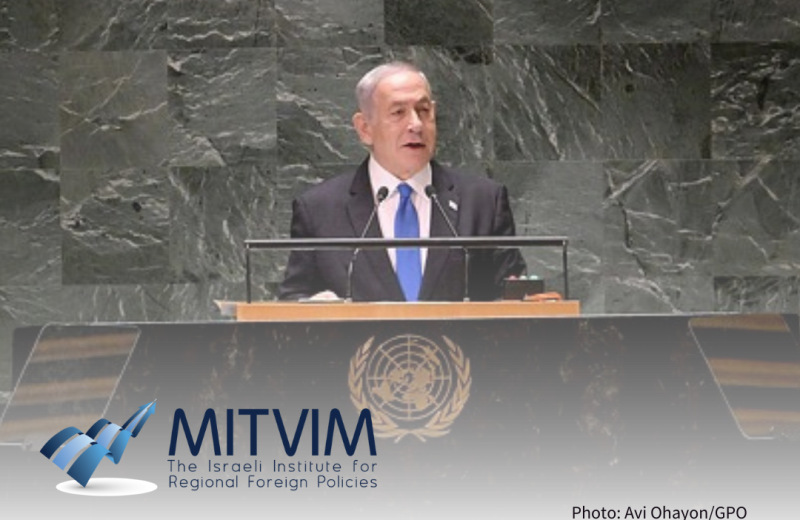 Op-eds
Op-eds
Israel must repudiate Netanyahu’s lack of statesmanship, which is leading Western countries to recognize a Palestinian state that could become a real Hamastan.
The flood of Western countries stepping up recently to recognize a Palestinian state should not have come as a surprise. In fact, 143 countries have already recognized it, most of them when PLO chairman Yasser Arafat announced its creation in Algiers in 1988. A steady drizzle of other states have joined over the years, such as Sweden, in 2014.
Two months ago, the foreign ministers of the United Kingdom and the United States said their governments were considering such recognition. Now, with the imminent declaration of recognition of a Palestinian state by Norway, Ireland, Spain, and Slovenia (with Malta and Belgium in the pipeline,) the trickle is starting to resemble a tsunami. Netanyahu’s political refusal to declare that at some future point he would be willing to establish a demilitarized Palestinian state, subject to international security guarantees, isolates and weakens Israel, with potentially disastrous results.
In numerous debates over the past three decades in parliamentary plenaries around the world and at various UN assemblies, the Palestinians have recorded several key achievements: deepening their diplomatic and economic ties with the countries that recognized them, as well as with other Western countries, and gaining recognition in 2012 of the Palestinian Authority (PA) as an observer state (although not a member) of the UN General Assembly. But with this recognition, the Palestinians cannot go to the bank and “cash” a state. An actual Palestinian state cannot be established without Israel’s consent.
What does recognition of a Palestinian state mean for Israel?
If recognition stops with the above four to five European countries, the move will remain symbolic, similar to Sweden’s recognition a decade ago. But in another scenario, which is not far-fetched, given strong global support for the Palestinians these days, the floodgates would open for the 50 countries that have not yet done so to recognize a Palestinian state. These would include the leading members of the Euro-Atlantic “moral majority” (France, Germany, UK, and, first and foremost, the United States,) with dire consequences for Israel.
There is a consensus among the member states of the European Union and the US on the need to establish a Palestinian state, and that the only solution to the conflict is two states that allow the two peoples to live side by side in security and peace (or at least without violence). This is a worthy vision. However, the states that are about to recognize a Palestinian state do not understand or do not want to see, that unilateral recognition of a Palestinian state will not result in a de facto Palestinian state and will not achieve security for Palestinians or Israelis.
With the PA at an unprecedented nadir and Hamas enjoying peak popularity on the Palestinian street, unilateral recognition of a Palestinian state by Western countries risks creating a state of “Hamastan.” Such an outcome would contradict the interests of those very same countries that seek to promote security, stability, and peace in the Middle East.
The Biden administration has made clear that it will not recognize a Palestinian state and that the issue should be settled in negotiations with Israel rather than unilaterally by third parties. Negotiations would allow Israel to present demands to the Palestinian side in order to ensure security, demilitarization, de-radicalization, an uncompromising fight to counter terrorism, and security coordination. However, such negotiations are unlikely under the hardline Netanyahu-Smotrich government.
Netanyahu’s refusal to engage in any discussion of a political solution on the day after the war precipitated the Norwegian, Irish, and Spanish decisions to recognize a Palestinian state. Such a step promises domestic political gains due to the broad support for it among their voters. Some leaders are trying to enhance their chances of securing an international position.
The price tag that the Netanyahu government can exact from these countries is low: The recall of ambassadors erodes Israel’s diplomatic maneuvering precisely when it is needed most – since there are high-level meetings that only ambassadors can conduct. At this difficult economic time for Israel, it would be irresponsible to harm arms sales or mutual intelligence transfers.
We must not forget the tremendous and unprecedented support Europe demonstrated for Israel in response to the October 7 Hamas massacre, including those member states critical of Israel. The current right-wing government has completely wasted this goodwill and credit, its policies alienating these governments rather than mobilizing their continued support through positive statesmanship. Norway, Ireland, and Spain directed their decision mostly against the Netanyahu-Smotrich government, prompted by a desire for Israelis and Palestinians to live side by side in peace and security.
Indeed, the idea of a Palestinian state is anathema for most Israelis. But with seven million Jews and seven million Palestinians living between the Jordan River and the Mediterranean Sea, separation from the Palestinians through political negotiations will make it possible to receive international guarantees of a demilitarized and de-radicalized Palestinian state. Such separation is vital to Israel’s national interest of remaining a democratic state and the home of the Jewish people.
Israel must repudiate Netanyahu’s lack of statesmanship, which is leading Western countries to recognize a Palestinian state that could become a real Hamastan. Instead, Israel, the Palestinians, the states in the region, and the West must commit to a process of lengthy negotiations that will ensure the strengthening of the moderate camp that wants peace and security – and thwart the efforts of Hamas, Hezbollah, and Iran to destabilize the Middle East.
The article was published on May 28th, in The Jerusalem Post.


